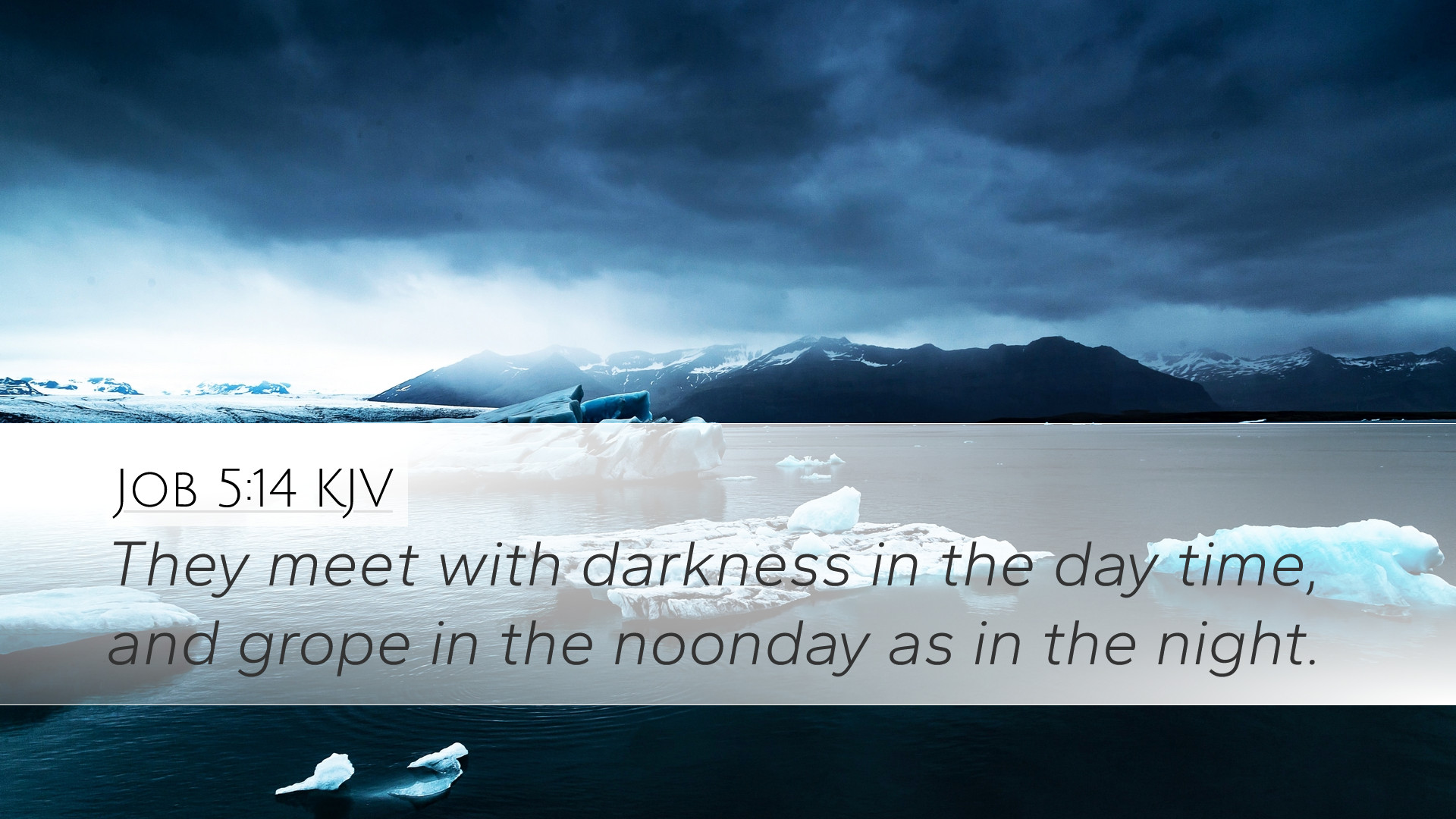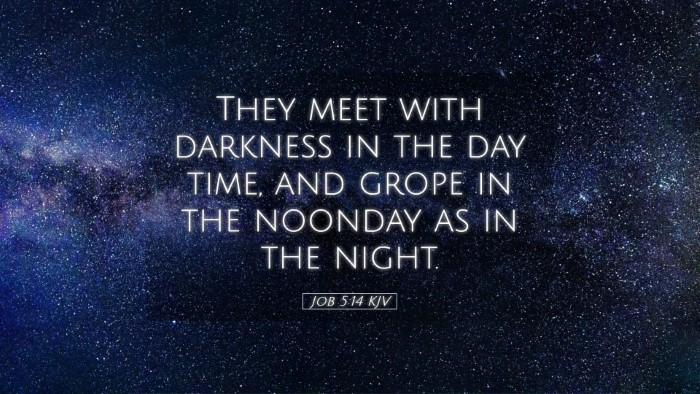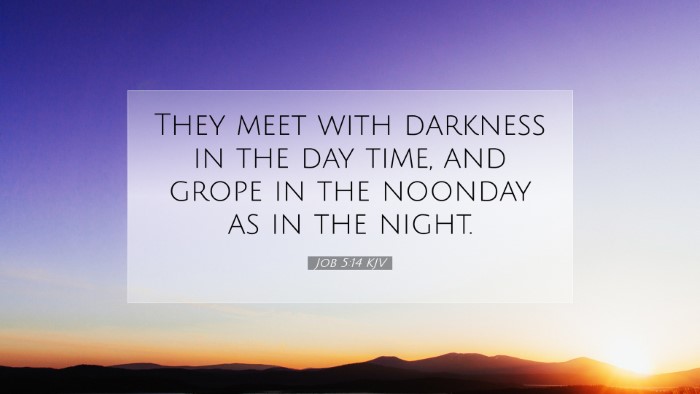Old Testament
Genesis Exodus Leviticus Numbers Deuteronomy Joshua Judges Ruth 1 Samuel 2 Samuel 1 Kings 2 Kings 1 Chronicles 2 Chronicles Ezra Nehemiah Esther Job Psalms Proverbs Ecclesiastes Song of Solomon Isaiah Jeremiah Lamentations Ezekiel Daniel Hosea Joel Amos Obadiah Jonah Micah Nahum Habakkuk Zephaniah Haggai Zechariah MalachiJob 5:14
Job 5:14 KJV
They meet with darkness in the day time, and grope in the noonday as in the night.
Job 5:14 Bible Commentary
Commentary on Job 5:14
Job 5:14: "They meet with darkness in the day time, and grope in the noonday as in the night."
Introduction
This verse from the book of Job presents a profound commentary on the wisdom of God in dealing with human suffering and the deeper realities of life. The dual imagery of darkness and groping illustrates the confusion and despair that can accompany both the human condition and divine providence. This commentary seeks to distill insights from notable public domain sources, including Matthew Henry, Albert Barnes, and Adam Clarke, to illuminate the full meaning and implications of this verse.
Contextual Background
The context of Job 5:14 is critical to understanding its meaning. Job's friend Eliphaz speaks, and he symbolizes the conventional wisdom of the time — that suffering is directly related to sin. Eliphaz has just described how God chastens individuals out of love (Job 5:17) and then elaborates on the consequences of such experiences. The imagery he employs in this particular verse signifies spiritual and moral confusion experienced by those who stray from God’s ways.
Insights from Matthew Henry
Matthew Henry interprets this verse with a focus on the folly of human wisdom. He notes that darkness at noon signifies the judgment of God upon the ungodly:
- The Absence of Clarity: Henry emphasizes that when one is in sin, they may find clarity and reason in the most inappropriate circumstances — the brightness of noon turns into the obfuscation of night.
- Spiritual Blindness: He suggests that such groping illustrates the inability of the soul to navigate life’s necessary trials without divine illumination.
- Divine Disfavor: According to Henry, the 'darkness' symbolizes God’s withdrawal of His guidance, causing individuals to stumble in their understanding and moral reasoning during times of trouble.
Insights from Albert Barnes
Albert Barnes provides a more practical application to the verse, focusing on how this imagery relates to real-life experiences:
- Universal Experience of Disappointment: Barnes states that everyone, at some point, encounters moments of bewilderment where their plans and feelings do not align with reality.
- Consequences of Sin: He notes that the ‘groping in the noonday’ can be understood as the impacts of sin on one’s life — causing one to seek truth, yet finding only confusion.
- Coping with Adversity: This verse can serve as an exhortation to readers; when faced with trials that obscure one’s path, reliance on God’s wisdom and strength is essential, as human understanding is limited.
Insights from Adam Clarke
Adam Clarke elaborates further on the metaphorical elements of the verse, emphasizing the emotional and psychological states of those who experience profound suffering:
- Psychological Turmoil: Clarke articulates that darkness in the daylight signifies a state of mental anguish where even the brightest times are overshadowed by despair and confusion.
- Need for Divine Guidance: He insists that without the guiding light of God’s Spirit, individuals will inevitably flounder in spiritual darkness, unable to find their way out of the trials besetting them.
- The Importance of Faith: Clarke’s analysis leads to the conclusion that maintaining faith during such trials is crucial, for it is through faith that one can transform moments of groping into times of growth and clarity.
Theological Implications
Job 5:14 stands as a profound warning against relying solely on human wisdom and understanding. Through the insights from various commentators, several theological implications arise:
- The Nature of Suffering: Suffering can lead to spiritual blindness or depth, depending on one’s response. Believers are called to perceive suffering as an opportunity for deeper reliance on God.
- Divine Sovereignty: This verse reflects God’s control over the natural order, where even the brightest days can turn dark, suggesting that human comprehension of divine justice and healing is often limited.
- Call to Humility: The blindness experienced can bring attention to human frailty and the need for divine support, urging believers to approach God with humility in their struggles.
Practical Applications
For pastors, students, theologians, and Bible scholars, understanding and applying Job 5:14 can yield significant insights:
- Encouragement for the Suffering: Use this verse to comfort individuals experiencing despair, highlighting that they are not alone, and that darkness can precede divine light.
- Teaching on Divine Wisdom: Emphasize the need for spiritual discernment and reliance on God amidst chaos, stressing that human wisdom is often inadequate.
- Facilitating Reflection: Encourage congregants or students to reflect on their own experiences of groping through life’s challenges and prayerfully seek God’s illumination and guidance.
Conclusion
Job 5:14 serves as both a warning and a source of hope. Through the collective insights of Matthew Henry, Albert Barnes, and Adam Clarke, a comprehensive understanding emerges — that in the midst of life’s uncertainties and darkness, there lies an invitation to lean on divine wisdom. This prophetic wisdom not only reveals the limitations of human understanding but also calls for deep faith and surrender to God’s greater plan, reminding believers that true clarity comes from above.


